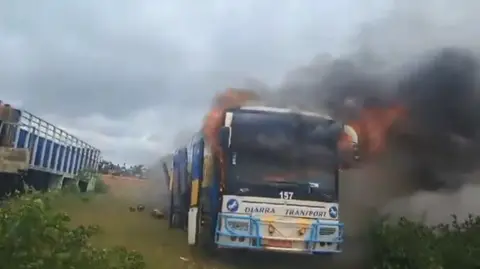
Mali’s junta moved to reassure the public after al-Qaeda-linked militants tightened a blockade on highways connecting Senegal and Mauritania to Bamako, where lorry convoys have faced ambushes, arson and kidnappings. Prime Minister Abdoulaye Maïga said security measures are being rolled out, acknowledging the disruption to fuel supplies that could cripple the landlocked economy.
Analysts say Jama’at Nusrat al-Islam wal-Muslimin (JNIM) is seeking to “economically asphyxiate” the capital by bottling up two western gateways — Kayes, Mali’s main corridor for Senegalese road and rail freight, and Nioro-du-Sahel on the Mauritania route. Checkpoints erected by fighters have restricted traffic and extracted informal “taxes,” with buses, tankers and freight trucks torched and foreign drivers abducted. Villages report shuttered markets, halted transport and disrupted public services. Separate ambushes hit fuel lorries from Ivory Coast in Bougouni, southern Sikasso, with several vehicles burned.
Fuel remains available in Bamako but prices have climbed by about 10% in some areas and power cuts have increased. The army initially dismissed talk of a siege as “information warfare,” saying widely shared footage of burning vehicles was older video, and insisted western routes had not been “systemically” blocked. It later announced airstrikes on a JNIM site at Mousafa in Kayes, claimed “several dozen” militants killed, and said reinforcements launched “hunting and destruction” operations on the Diéma–Nioro corridor. State media reported hostages were freed, without numbers. Residents say checkpoints persist and some hauliers have paused operations.
Kayes, which accounts for roughly 80% of Mali’s gold output and serves as the country’s “gateway to Senegal,” is a logistics hub vital to the import of fuel, food and manufactured goods. The blockade marks a geographic expansion of JNIM activity from Mali’s north and centre toward the south and west, tightening a ring around Bamako. Senegal’s truckers’ union warned the abductions imperil regional commerce; Mali is Senegal’s top African trade partner, with more than $1.4 billion in exports last year.
The crisis highlights limits of a force-first strategy backed by Russian Africa Corps personnel, and raises fears of spillover along coastal trade arteries. If sustained, analysts say, the blockade could evolve into a prolonged siege undermining public confidence and straining two economies tied to the Dakar–Bamako corridor.
